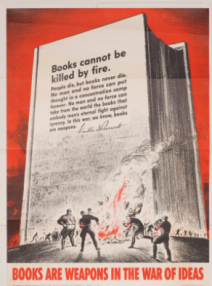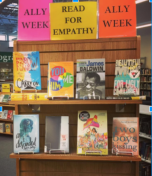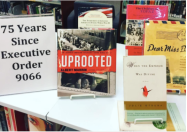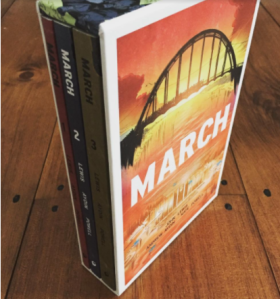Books Are Weapons in the War of Ideas
A version of this piece originally appeared at VTDigger.org on 8/17/17

BOOKS ARE WEAPONS IN THE WAR OF IDEAS is an oft-used paraphrase of Franklin D. Roosevelt speeches and FDR-commissioned posters during WWII.
And make no mistake about it, we are fully entrenched in the latest battle of the war of ideas that has been raging in this country since before its founding. “Others” are still misunderstood, hated, discriminated against, persecuted, and killed all over the US. And as an educator living and working in the quiet towns of Moretown and Hinesburg, respectively, I often feel like I don’t have much to offer this fight.
But, luckily, I have books.
 Socioeconomic status aside, Vermont is a terribly homogeneous state. If, like me, you don’t live, work, or attend school in Burlington or Winooski, weeks can pass around here that include a mere handful of interactions with non-white people. The best way I know to even remotely attempt to understand the experiences of the amazing array of people who exist in this world is to become them in the books I read.
Socioeconomic status aside, Vermont is a terribly homogeneous state. If, like me, you don’t live, work, or attend school in Burlington or Winooski, weeks can pass around here that include a mere handful of interactions with non-white people. The best way I know to even remotely attempt to understand the experiences of the amazing array of people who exist in this world is to become them in the books I read.
Recent research studies at Stanford University and Emory University show that stories  positively affect the way the brain learns and processes information. In short, if someone is simply told or exposed to a piece of information, a small section of the brain activates to process that input. In contrast, when information is acquired through story, the brain’s empathy centers light up, almost mimicking the brain activity of someone who’d actually experienced the same described event or emotion.
positively affect the way the brain learns and processes information. In short, if someone is simply told or exposed to a piece of information, a small section of the brain activates to process that input. In contrast, when information is acquired through story, the brain’s empathy centers light up, almost mimicking the brain activity of someone who’d actually experienced the same described event or emotion.
You can’t create experience out of nothing. You can’t gain empathy by sitting idly by. Knowledge doesn’t grow without the water and sunlight of new ideas.
I’m not trying to say that books are the same as having had the experience, but they allow us to get a little closer to an understanding. And that little bit can mean a lot.
Since I watched VICE News’s video report on the Charlottesville white-supremacist rally, I can’t  shake the image of a few, brave University of Virginia students who locked arms around a Thomas Jefferson statue to oppose the vitriolic racists. I thought back to The Hate U Give by Angie Thomas and her protagonist, Starr, a black teenager trying to navigate the gross injustice of her southern city. When African-Americans in Charlottesville reminded us that this event is not much of an outlier; that this is what it’s like to be black and brown in our country, my mind flashed to scenes from Between the World and Me by Ta-Nehisi Coates, a searing version of “the talk” most men of color have with their sons. When I saw images of gay men chanting at the marchers who wanted to eradicate them from the country (if not the planet), I thought of the Greek chorus of AIDS victims who narrate Two Boys Kissing by David Levithan, and I wondered about all of the twisted forces in history that made white and straight and male the default form of existence. When the Neo-Nazis in Virginia chanted “Jews will not replace us,” I wanted to re-read Zealot to better understand author Reza Aslan’s take on the historical Jesus and his roots as an ordinary Jew in ancient Palestine. The interviews with the advocates for a “white state” featured too many stereotypes and misconceptions to count, and it furthered my belief that March by John Lewis, American Born Chinese by Gene Luen Yang, and Jumped by Rita Williams-Garcia should be required reading for every American teenager.And, when President Trump blamed “many sides,” I immediately compared it to “Rape” by Adrienne Rich from Diving into the Wreck: Poems 1971-1972:
shake the image of a few, brave University of Virginia students who locked arms around a Thomas Jefferson statue to oppose the vitriolic racists. I thought back to The Hate U Give by Angie Thomas and her protagonist, Starr, a black teenager trying to navigate the gross injustice of her southern city. When African-Americans in Charlottesville reminded us that this event is not much of an outlier; that this is what it’s like to be black and brown in our country, my mind flashed to scenes from Between the World and Me by Ta-Nehisi Coates, a searing version of “the talk” most men of color have with their sons. When I saw images of gay men chanting at the marchers who wanted to eradicate them from the country (if not the planet), I thought of the Greek chorus of AIDS victims who narrate Two Boys Kissing by David Levithan, and I wondered about all of the twisted forces in history that made white and straight and male the default form of existence. When the Neo-Nazis in Virginia chanted “Jews will not replace us,” I wanted to re-read Zealot to better understand author Reza Aslan’s take on the historical Jesus and his roots as an ordinary Jew in ancient Palestine. The interviews with the advocates for a “white state” featured too many stereotypes and misconceptions to count, and it furthered my belief that March by John Lewis, American Born Chinese by Gene Luen Yang, and Jumped by Rita Williams-Garcia should be required reading for every American teenager.And, when President Trump blamed “many sides,” I immediately compared it to “Rape” by Adrienne Rich from Diving into the Wreck: Poems 1971-1972:
And so, when the time comes, you have to turn to him,
the maniac’s sperm still greasing your thighs,
your mind whirling like crazy. You have to confess
to him, you are guilty of the crime
of having been forced.
Part of our mission as educators is to help students make sense of the world. And while I’m not advocating for indoctrination, I am urging all of us not to remain completely neutral and objective in our teaching spaces. Being apolitical is a political act in itself, and we can’t afford to miss opportunities to engage with our students on these important and relevant issues.
When the war of ideas has “many sides,” books can be the weapons to help us pick the right one.
______
Further Reading and Booklists:
“Social Justice Books: a Teaching For Change Project”
“My Daughter’s Summer Reading List is Old School, and Not in a Good Way” by David Valdes Greenwood
“Activism Starts with You: Novels to Inspire Empathy” by Emma Carbone
“Guide for Selecting Anti-Bias Children’s Books” by Louise Derman-Sparks
“Where to Find Diverse Books” from WeNeedDiverseBooks.org
“Missing From the Shelf: Book Challenges and Lack of Diversity in Children’s Literature” from Pen America
“Study: Reading a Novel Changes Your Brain” by Julia Ryan
Peter Langella is a librarian at Champlain Valley Union High School, an English Instructor at Johnson State College, and a 2017 Rowland Fellow. He will lead a workshop called Read For Empathy at the 2017 Rowland Conference. He is currently reading Confessions of a Recovering Environmentalist and Other Essays by Paul Kingsnorth
